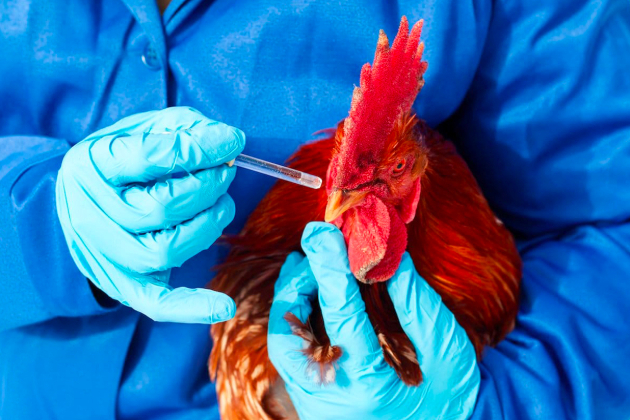Skin disorders can deeply affect your mental health: Research
ANI
25 Jun 2022, 17:07 GMT+10

Washington [US], June 25 (ANI): According to recent research, people specifically youngsters and children, suffering from Skin disorders may suffer from physical and mental health problems, regardless of treatments being available.
The Medical Research Foundation has funded research for advanced scientific understanding of these conditions, which could ultimately lead to improved support and treatment for children and young people living with skin disorders.
Skin disorders can have a negative impact on all aspects of life, from schooling and relationships to career and lifestyle choices. Adolescence in particular is a time of self-consciousness, self-doubt and exaggerated concern with appearance and physical attractiveness. It represents a critical period in physical and psychological development, which is why skin disorders - which are very common in this age group - can have such an enduring impact.
According to a 2020 survey by the All Parliamentary Group on Skin, 98 per cent of patients with a skin disorder report that their condition affects their emotional and psychological wellbeing, yet only 18 per cent have received some form of psychological support.
New research, led by scientists from King's College London and Newcastle University, will investigate two skin disorders in particular - eczema and ichthyosis - which are both known to have a profound impact on quality of life.
Understanding the link between severe itching, sleep disturbance and brain function in eczema - Professor Carsten Flohr, Chair in Dermatology and Population Health Sciences at King's College London and Honorary Consultant in Dermatology at St John's Institute of Dermatology, Guy's and St Thomas' NHS Foundation TrustEczema is an inflammatory skin disease affecting 20 per cent of children and eight per cent of adults. It is strongly linked to severe impacts on quality of life, as well as psychological and psychiatric illness such as anxiety, depression and attention-deficit hyperactivity disorder (ADHD).
Eczema often starts before the age of two, and affected babies may develop poor sleep habits early. Eczema persists into adolescence or adulthood in around 30 per cent of cases, meaning that people with eczema can suffer with itchy skin and disturbed sleep for large parts of their lives.
Poor quality sleep affects memory, concentration and mood, and in healthy children and young people, poor quality sleep has been associated with poorer educational outcomes.
Crucially, in children and young people with eczema, those without sleep disturbance do not have a significantly higher risk of ADHD than the general population, whereas for children and young people with eczema and sleep disturbance, the chance of having ADHD is 40-50 per cent higher than those without eczema. This suggests that sleep disturbance itself can be associated with psychological and cognitive difficulties.However, researchers do not fully understand the links between eczema, itching and mental health issues. Professor Flohr and colleagues propose that chronic inflammation in the skin and blood, leading to sleep disturbance and inflammation in the brain, are likely to be important drivers of these mental health issues.
To test this theory, Professor Flohr will study patients aged 12-18 from the Paediatrics Severe Eczema Clinic at St Thomas' Hospital and King's College London, comparing adolescents with eczema to healthy adolescents, and to children and young people with ADHD.
The researchers will investigate whether brain structure and function, and thought processes, are affected by sleep disturbance and inflammation. This includes assessments using sleep diaries and gadgets, measurements of brain activity, and blood tests to measure changes in circadian rhythm (the natural body clock). Professor Flohr and colleagues will also examine the lived experience of sleep disturbances related to eczema, as well as its cognitive and psychosocial impact.Professor Flohr said: "We think the mental health issues seen in children and young people with eczema could in part be explained by chronic inflammation in the skin and blood, leading to sleep disturbance and inflammation in the brain. Thanks to funding from the Foundation, we will be able to address this theory, with the long-term aim of developing strategies to help manage sleep disturbance better. Potentially, this could prevent the knock-on psychological effects we see in children and young people with eczema."Investigating severe forms of the genetic condition 'ichthyosis' - Dr Neil Rajan, Senior Lecturer and Honorary Consultant Dermatologist, Newcastle UniversityThere are many different types of ichthyosis, but they all feature the development of inflamed, scaly skin.
Ichthyosis can be inherited (genetic) or acquired during life. The inherited forms are rare, generally present from infancy, and are usually lifelong conditions. Acquired ichthyosis can develop at any age due to a number of medical problems, such as kidney disease.
Unlike skin conditions such as eczema, which tends to be patchy and come and go with time, in ichthyosis the scaling is present throughout life and usually affects the whole body. Ichthyosis sufferers can face harassment, discrimination and uncomfortable symptoms that are often only relieved by time-consuming treatments - all of which can have a marked impact on mental health.
Researchers know that genetic ichthyosis can be caused by changes in DNA that affect skin cells, but little is known about how such DNA changes cause the skin to become scaly and inflamed. In some cases, skin cells are formed at a faster rate than they are needed, and they pile up on the skin surface, thickening the skin. In other forms, the cells are produced at the normal rate but instead of brushing off when they reach the surface, they cannot become detached from the cells beneath them and so they build up in layers (https://www.ichthyosis.org.uk/).
Working with Professor Muzlifah Haniffa from Newcastle University and the Wellcome Sanger Institute, and Professor Edel O'Toole from Queen Mary University of London, Dr Rajan will study how skin cells in patients with severe types of ichthyosis are different from normal skin cells, and why the protective barrier in the skin is weakened. He wants to study how the immune system reacts to this weakness in the skin barrier, looking at these differences across different layers of the skin.
The researchers hope that by doing this, they will be able to find changes in the skin of patients with ichthyosis that could potentially be improved by new treatments. To test potential treatments, they will grow skin cells in the lab, which will allow them to see if such drugs are able to 'treat' ichthyosis in the lab.
Dr Rajan said: "Adolescence is a time of self-consciousness, self-doubt and exaggerated concern with appearance and physical attractiveness - all of which can make ichthyosis an especially painful experience for teenagers. By studying skin samples taken from ichthyosis patients, we're hoping to reveal more about the genetics underpinning the condition, which is needed in order to develop much-needed new treatments for adolescents with ichthyosis."Co-investigator, Professor Edel O'Toole from Queen Mary University of London, is an expert on ichthyosis and is Chair of the Medical Advisory Board of the Ichthyosis Support Group. Professor O'Toole said: "Young people with severe ichthyosis really suffer and I hope this research will provide new insights which will lead to advances in treatment." (ANI) Share
Share
 Tweet
Tweet
 Share
Share
 Flip
Flip
 Email
Email
Watch latest videos
Subscribe and Follow
Get a daily dose of New Orleans Sun news through our daily email, its complimentary and keeps you fully up to date with world and business news as well.
News RELEASES
Publish news of your business, community or sports group, personnel appointments, major event and more by submitting a news release to New Orleans Sun.
More InformationBusiness
SectionWall Street rallies on Federal Resrve decision
NEW YORK, New York - U.S. stocks rose Wednesday despite the U.S. Federal Reserve signalling a potential slowdown in the U.S. economy,...
Trump repeals $17.75 minimum wage rule for federal contractors
WASHINGTON, D.C.: President Donald Trump has reversed a Biden-era executive order requiring businesses with federal contracts to pay...
UBS CEO Ermotti to earn $17 million in 2024, report says
FRANKFURT, Germany: UBS CEO Sergio Ermotti will receive a pay package of just over 15 million Swiss francs (US$17 million) for 2024,...
France calls for talks as EU bourbon tariffs backfire
PARIS, France: French Prime Minister Francois Bayrou acknowledged over the weekend that the European Union may have miscalculated by...
U.S. stock markets slide, Dow Jones drops 260 points
NEW YORK, New York - Sellers took charge again on Wall Street Tuesday as the brief rebound that took place on Monday petered out. Stocks...
Expansion of Montana coal mine approved by US
WASHINGTON, D.C.: The Trump administration has approved a plan to expand a coal mine in Montana and keep it running for 16 more years,...
International
SectionUnited Nations building in Gaza destroyed, 1 dead, 5 injured
As Israeli tanks rolled into Gaza on Wednesday heralding a new ground invasion, a UN building was destroyed in a bombing, killing one...
Massive job cuts at Johns Hopkins as US administration pulls funding
WASHINGTON, D.C.: Johns Hopkins University announced this week that it will cut over 2,000 jobs in the U.S. and other countries. This...
US to revoke more student visas after Columbia arrest
LA MALBAIE, Canada: The United States will likely revoke visas of more students in the coming days, U.S. Secretary of State Marco Rubio...
US cuts VOA funding, puts 1,300 staff on leave
WASHINGTON, D.C.: The U.S. government has placed more than 1,300 Voice of America (VOA) employees on leave and slashed funding for...
Boeing under fire as US officials demand stricter oversight
WASHINGTON, D.C./SEATTLE: Boeing is facing mounting scrutiny after a series of safety lapses and manufacturing issues, with U.S. Transportation...
Bird flu vaccines could curb outbreaks, but export fears stall plans
OMAHA, Nebraska: Vaccines could help stop bird flu and prevent the mass killing of chickens, which has driven egg prices up to nearly...













